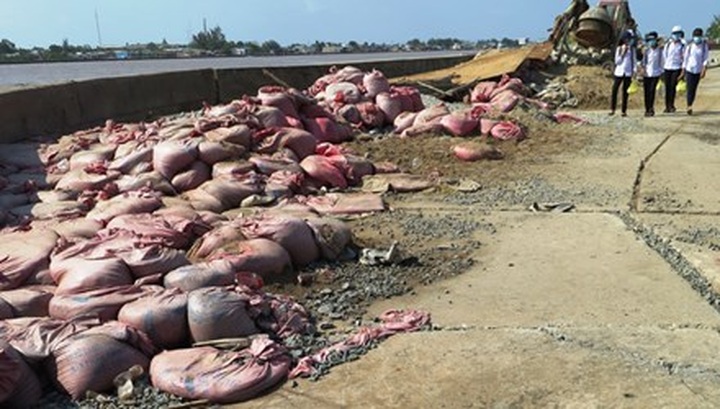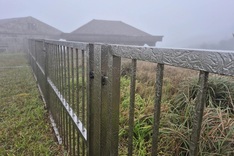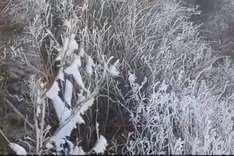Salt water intrusion and drought in the early period of the dry season is already having dire consequences for the economy and people's lives in the Mekong Delta.

Ganh Hao Embankment in Bac Lieu Province
High tides ruptured parts of the embankment in Bac Lieu Province. Director of the local Department of Agriculture and Rural Development thinks a lack of sediment might have made it easier for the embankments to erode. In Ca Mau Province, high tides submerged parts of Ho Chi Minh Highway, damaged two sewers and 400m of a local embankment. Nearly 2,700 hectares of farmed shrimp have diseases, an increase of 300 percent compared to last year.
Le Ha Trieu, deputy head of Hamlet 6 in Ca Mau Province, said over 100 households were allocated two to four hectares of forestland near the sea and to raise seafood. "But erosion forced them to find other jobs," he said.
Areas such as Go Cong District and Tra Vinh Province which are only 30 to 45km away from the sea lack water for their crops because of an increase of salt water in rivers and channels.
The El Nino weather phenomenon, which brings higher temperatures, has already negatively affected economy and people's lives in nine out of 13 cities and provinces of the delta. Since the end of 2015, nearly 139,000 hectares of rice have been damaged and freshwater for 155,000 households have been contaminated by saline water. Ca Mau, Kien Giang, Bac Lieu and Ben Tre provinces are hardest hit.
Director of Can Tho City Department of Planning and Investment, Nguyen Van Hong, said increasing numbers of foreign investors had expressed worries over climate change when invited to invest in Mekong Delta. During 2011-2015 period, industrial zones in Can Tho only attracted six small FDI projects valued at USD9.26m.
Droughts have occurred early in the dry season worsened the situation. Duong Hoai Nam, director of Ca Mau Transport Department said, "Water levels in rivers and streams in Tran Van Thoi and Thoi Binh districts dropped to an average of 70cm to a metre high. Several rivers have completely dried out, paralysing waterway traffic."
Local authorities are calling for investment to dredge channels and canals, reinforce embankments and guide farmers to adopt alternative agricultural method.
On March 7, Prime Minister Nguyen Tan Dung held a meeting with local authorities to discuss the urgent situation. Minister of Agriculture and Rural Development Cao Duc Phat suggested that aside from closely monitoring fresh water sources, the authorities should provide fresh water for households affected by salt water. Phat also proposed to give VND215bn to buy new seeds and VND623.8m to deal with the damage at 39 localities. He also suggested investing over VND1trn in construction projects to mitigate drought and salt water intrusion.
The Ministry of Natural Resources and Environment was asked to work with countries which the upstream part of Mekong River flows through to better manage the hydropower reservoirs and provide water to farmers.




















